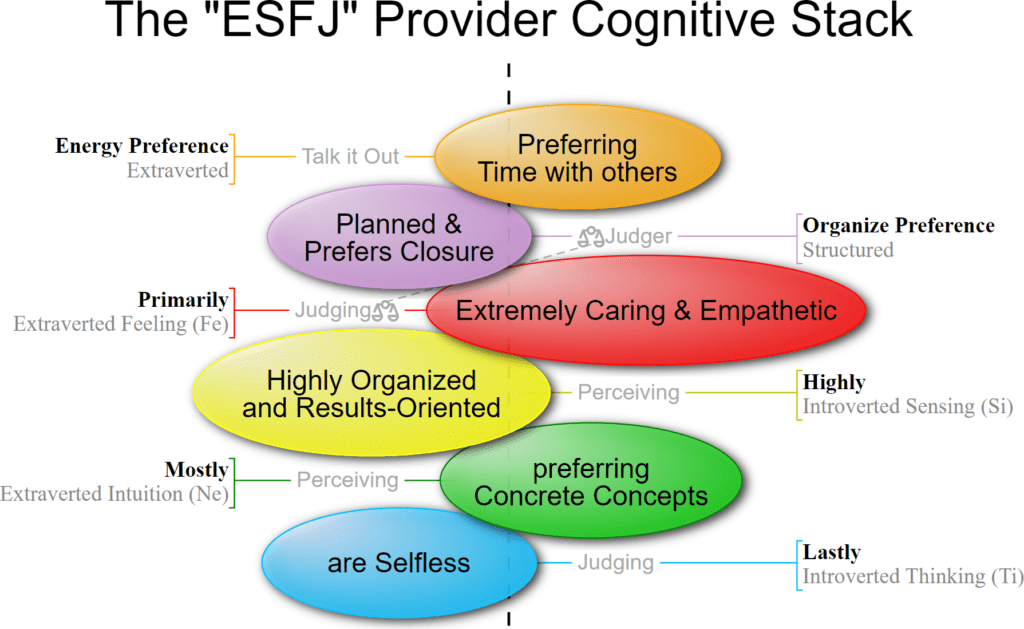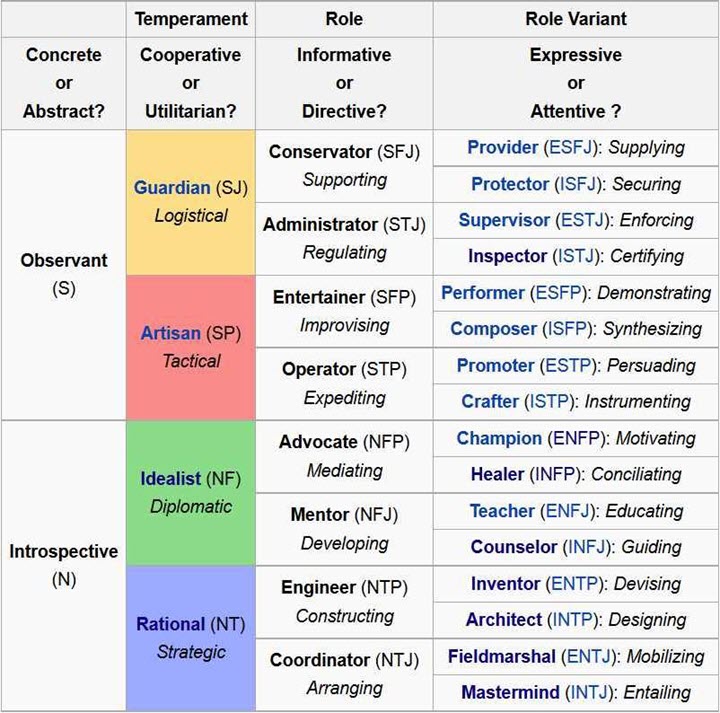What is the Keirsey ESFJ “Provider” Personality Type?
The Keirsey ESFJ “Provider” Personality Type is a Guardian Temperament with a Concrete Communication Style and a Cooperative Action Style.
Keirsey organized the Four Temperaments as a matrix. There are two communication styles, abstract and Concrete, similar to the Myers-Briggs Intuition (Abstract) and Sensing (Concrete) “Perceiving” Cognitive Functions.
And by two action styles: cooperative and utilitarian. Utilitarian people, for the most part, do what works, while Cooperative people do what’s right.
Keirsey named the Four Temperaments as suggested by Plato: Artisan (Iconic), Guardian (Pistic), Idealist (Noetic), and Rational (Dianoetic).

Concrete versus Abstract Communication Style
Keirsey divided the Four Temperaments into two Communication Styles: Abstract and Concrete. These styles resemble the Myers-Briggs Intuition and Sensing “Perceiving” Cognitive Functions.
Some people talk primarily about everyday reality’s external, concrete world: facts and figures, work and play, home and family, news, sports, and weather—all the who, what, when, where, and how of life.
Other people talk primarily about the internal, abstract world of ideas: theories and conjectures, dreams and philosophies, beliefs and fantasies—all the whys, ifs, and what might be of life.
Concrete people talk about reality in their daily lives, while Abstract people talk about ideas.
According to Keirsey, everyone can engage in both observation and introspection. People are observant when they touch objects or otherwise perceive the world through their five senses. When people reflect and focus on their internal world, they are introspective. However, individuals cannot engage in observation and introspection at the same time. The extent to which people are more observant or reflective affects their behavior.
People who are generally observant are more ‘down to earth.’ They are more concrete in their worldview and focus on practical matters such as food, shelter, and their immediate relationships. Carl Jung used the word sensation when describing people who prefer concrete perception.
Generally, reflective people have more ‘heads in the clouds’ and abstract worldviews. They focus on global or theoretical issues such as equality or engineering. Carl Jung used the word intuition to describe people who prefer abstract perception.
Cooperative versus Utilitarian Action Style
Some people act primarily practically or pragmatically; that is, they do what gets results, what achieves their objectives as effectively or efficiently as possible. They only check afterward to see if they observe the rules or go through the proper channels.
Other people act primarily cooperatively or socially acceptable; they try to do the right thing in keeping with agreed-upon social rules, conventions, and codes of conduct. Only later do they concern themselves with the effectiveness of their actions.
These two ways of acting can certainly overlap, but as they lead their lives, utilitarian people mostly do what works, while cooperative people do what’s right.
Keirsey compares the differing temperaments with cooperative (Complying) and pragmatic (Adaptive) temperaments. Cooperative people pay more attention to other people’s opinions and are more concerned with doing the right thing. Sensible people (Utilitarian) pay more attention to their thoughts or feelings and are more concerned with doing what works. No comparable idea in the MBTI or Jung corresponds to this dichotomy, which is a significant difference between Keirsey’s work and Myers and Jung’s.
The pragmatic temperaments are Rational (pragmatic and abstract) and artisan (Pragmatic and concrete). The Cooperative Temperaments are Idealists (Cooperative and Abstract) and Guardians (Cooperative and Concrete). Neither the MBTI nor Jung included the concept of Temperament in their work.
ESFJ Keirsey/MBTI Correlation
| Keirsey | MBTI | |
|---|---|---|
| E | Expressive Role Variant | Extraverted Feeling |
| S | Concrete Communication Style | Introverted Sensing Auxiliary Function |
| F | Informative Role | Extraverted Feeling Dominate Function |
| J | Cooperative Action Style | Feeling is a Judging Function |
With Extraverted Feeling as the dominant function and Introverted Sensing as the auxiliary function, the MBTI ESFJ “Provider” personality type aligns with the Keirsey ESFJ “Provider” personality type.

ESFJ Personality Type cross-reference
- Keirsey Type – Provider
- Temperament Type – Melancholy
- Animal Type – Beaver
- DISC Type – Compliant
- Socio-Communicative Type – Analytical
- True Colors – Gold
- Color Code – White
- Personality Compass – East
- Occupational Type – Realistic
- Learning Type – Pragmatist
- Leadership Type – Avoider
Enneagram Types
Provider Personality Characteristics
Providers take it upon themselves to ensure the health and welfare of those in their care.
Still, they are also the most friendly of all the Guardians and thus are the great nurturers of social institutions such as schools, churches, social clubs, and civic groups.
Providers are likely more than ten percent of the population, which is fortunate for the rest of us because friendly social service is a key to their nature.
Highly cooperative themselves, providers are skilled in maintaining teamwork among their helpers and are also tireless in paying attention to the details of furnishing goods and services.
They make excellent chairpersons for dances, banquets, class reunions, charity fund-raisers, etc.
They are without peers as masters of ceremonies, able to speak publicly with ease and confidence. And they are outstanding hosts or hostesses, knowing everyone by name and seemingly aware of what everyone’s been doing.
Providers love to entertain and are always concerned about their guests’ needs, wanting to ensure that everyone is involved and provided for.
Friendly, outgoing, neighborly – in a word, Providers are gregarious, so much so that they can become restless when isolated from people.
They love to talk with others, often strike up a conversation with strangers, and chat pleasantly about any topic that comes to mind.
Friendships matter greatly to Providers, and their conversations with friends often touch on good times from years past. Family traditions are also sacred, and they carefully observe birthdays and anniversaries. In addition,
Providers show a delightful fascination with news of their friends and neighbors.
They’re happy to provide all the details if we want to know what’s been happening in the local community, school, or church.
Providers are extremely sensitive to the feelings of others, which makes them perhaps the most sympathetic of all the types. However, they are also somewhat self-conscious and susceptible to what others think of them.
Loving and affectionate themselves, they need to be loved in return.
Crushed by personal criticism, Providers are happiest when given ample appreciation for themselves and the tireless service they provide to others.
Famous Providers
William Howard Taft, Barbara Walters, J C Penney, Ray Kroc, Louis B. Mayer, Sam Walton, Dolley Madison, and Dave Thomas are examples of Provider Guardians.

What are the Keirsy Personality Temerpaments?

David Keirsey, born in 1921, was an American psychologist specializing in conflict management and family counseling. He began researching human behavior and Personality in the 1940s.
Keirsey blended the Myers-Briggs Personality Types with Ernst Kretschmer’s model of the Four Temperaments, developing the Keirsey Temperament Sorter, which was made famous by his book “Please Understand Me.”
Instead of using the term Personality, Keirsey used Temperament. He viewed it as a configuration of observable Personality Traits, communication habits, patterns of action, characteristic attitudes, values, and talents. To Keirsy, Temperament encompasses personal needs, individual contributions, workplace contributions, and societal roles.
Keirsey correlated the sixteen MBTI Personality Types into Four Temperaments. He divided each Temperament into two Roles: informative and Directive. He subdivided the roles into expressive (extraverted) and attentive (introverted) role Variables.
Informative versus Directive Roles
Keirsey distinguishes between people who generally communicate by informing others versus those who speak by directing others. This distinction subdivides each of the four Temperaments into eight Roles.
Expressive versus Attentive Role Variants
Individuals who act before observing are Expressive. In contrast, people who follow before working are Attentive.
Expressive and attentive variants further subdivide the eight roles into 16 types correlating to the 16 Myers-Briggs personality types.


